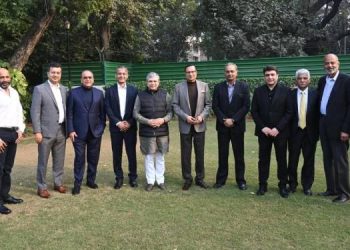New Delhi: As the Indian economy follows the cautiously optimistic road to recovery, the Government of India has been proactively announcing various revival policies and schemes. Of such, the Union Government unveiled the ‘National Monetisation Pipeline’ (NMP) developed by NITI Aayog to monetize several national infrastructure assets through a lease in the next four years.
With an aim to explore and understand the impact of NMP, CNBC-TV18, India’s leading English business news channel and Standard Chartered Bank brought together policymakers, and industry stalwarts to analyze, and comprehend India’s Monetisation Pipeline at the new edition of Leadership Collective- ‘India’s Monetization Mantra’ hosted on 22nd October 2021.
The event started with a welcome address by Shereen Bhan, Managing Editor, CNBC-TV18, followed by a keynote address by Tuhin Kanta Pandey, Secretary Department of Investment and Public Asset Management (DIPAM).
Furthermore, the panel discussion “NMP: Mission Rs 6 Lakh Crore” laid out the roadmap, highlighted the challenges and gauged the future anticipation for the infra sector. The panelists comprised Zarin Daruwala – Cluster CEO, India & South Asia markets, Standard Chartered Bank, Shailesh Pathak – CEO, L&T IDPL & Co-chairman, FICCI Transport Infrastructure Committee, Vineet Agarwal – Managing Director, TCIL & President, ASSOCHAM, and Sachin Bhanushali – CEO & Whole-time Director, Gateway Rail Freight Limited & Chairman, CII National Committee on Railways (Transport). The conversation revolved around key priorities and opportunities to consolidate the country’s infra gains.
Tuhin Kanta Pandey highlighted some essential market related expectations. He spoke about the next steps to file DRHP with SEBI for LIC IPO while stating, “We are hoping to do it in the last quarter, this is an IPO, and we need to prepare the company in terms of the SEBI requirements and embedded value, which is critical in this case being an insurance company. All that work is in progress, and advisors are in place.” He also mentioned that “This is going to be one of the biggest IPOs in the market, and certainly will create a lot of excitement in Indian capital markets and around the world as well.”
Speaking on the government plans and opportunities in terms of roadways and railways as assets, Sachin Bhanushali mentioned, “Considering the roadways and railways, they are a part of network and network revenue accruing to the private sector investment is something which needs to be clearly defined. It is very difficult to pinpoint the revenues which accrue to these assets as the revenue accrues to the entire network as the freight which is collected is applicable for the entire network. So, in order to understand what is it that the investing entity is going to get out of it in terms of an assured return, because all these brownfield assets are going to be post-execution assets, and that’s why I’m sure the returns which are expected are going to be lesser than the returns which will be there as far as greenfield opportunities are concerned.”
Zarin Daruwala highlighted some key matters, she suggested “The government needs to consider on the relaxation of the requirement of double-A ratings of the sponsor for government sector NPS schemes. Second, we also need clarity on the treatment of which unit capital to be treated as net worth to enable pension funds to invest in debt securities issued Also, the inclusion of InvITs and REITs as eligible infrastructure investment for the purpose of Income Tax Act, Section 54 EC. Essentially if there are any long-term capital gains, if you invest in NHAI or REC bonds, you’re able to get the benefit. I think the similar exemption should be extended to InvITs and REITs”
Voicing his concerns on the NMP Construct, Shailesh Pathak requested Tuhin Kanta Pandey for some key considerations. Some of the suggestions he stated were, “The government must put a quarter timeline on the assets that will be monetized each quarter. Secondly, not to declare a reserve price from the government side to the bidders. The third is not to have too many bidders, consider a two-stage bid, where in the first stage, you set high bars on qualification. And then you shortlist not more than seven not less than five, which will lead us in the private sector to do lots of due diligence on the bid, and we will put a number that we will stick to instead of a guesstimate. Fourthly, strict adherence to the PPP contract and lastly the government needs to unlock the entire value of the asset.”
Acknowledging the efforts on the NMP plan by the government, Vineet Agarwal expressed, “I must commend the government on this great initiative because moving the expenditure of our infrastructure from 7-8% to about 10- 11% is a huge and humongous task, and we as a country really need that. And now we are seeing the NMP, the PM Gatishakti program, and the national single window policy framework, I think all of this is coming together quite beautifully. So, this is extremely positive and very enthusiastic to all kinds of investors. Policy continuity shall be key to this program, followed by a concrete dispute resolution plan and lastly the exit plan.”
The event concluded with opinions, insights, and thought-provoking conversations, shared by industry stalwarts and a closing note by Shereen Bhan.

















